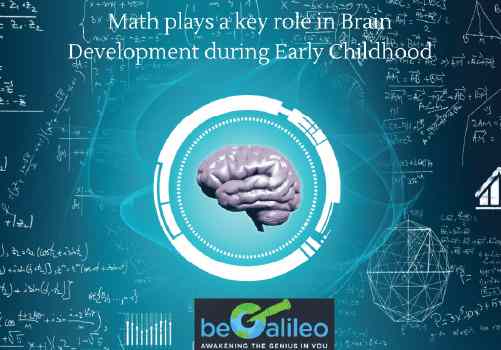
Have you ever wondered “what is math” and “how does it help”? Or “why do you study math?” Math has no universally accepted definition, but according to Webster’s dictionary, it is the science of numbers and their operations, interrelationships, combinations, generalisations, and abstraction, as well as space configuration and its structure, measurement, transformations, and generalisations. The term “mathematics” is derived from the Greek word “mathema,” which translates to “what one learns.” It could also indicate “study” or “science.”

Maria Montessori, an Italian physician, educator, and innovator, believed that human intellect is not merely a function of natural intelligence but of mathematical intelligence. Math is more than memorising formulas and performing calculations. Rather, it involves shapes, space, patterns, symbols, and the interaction between them.
Dr. Montessori posited that children possess an innate mathematical inclination, characterized by the impulse to bring order to chaos. This aligns with the perspective of a French philosopher and mathematician, Blasie Pascal, who believed that the human mind has a natural mathematical disposition, and that knowledge and progress arise from careful observation. Children have a natural inclination to acquire skills that enhance their precision, organization, powers of observation, comparison, and categorization. Humans instinctively engage in calculations, measurements, reasoning, abstraction, imagination, and creativity. Nurturing and guiding this essential aspect of intelligence is crucial for its development and functionality. If a child’s early experiences do not cultivate a mathematical mind, their subconscious mind may not readily embrace it in later stages.
Unlock Your Child's Math Potential with beGalileo!

🚀 Transform their math skills with personalized, 1-on-1 classes.
🧮 Experience integrated math and coding for real-world application.
👦 See your child excel—start with a Free Trial Math Class today!

Research shows that Math is critical for brain development during early childhood years
Introducing math during the early childhood years plays a vital role in brain development. The math skills acquired in these formative years establish the foundation upon which further learning is built throughout one’s life. Research suggests that childhood math proficiency reflects more on memory capabilities than overall intelligence. Brain studies conducted on children who have engaged in mathematical equations reveal that as they grow older, the memory section of their brain becomes notably more developed compared to the counting sections. An intriguing experiment conducted by Stanford University involved 7-9-year-old children solving problems while their brain activity was tracked using MRI technology. A year later, the same test was administered, and the results revealed that these children’s brains had remarkably well-developed fact retrieval abilities. Furthermore, physical changes were observed in their brains, specifically in the hippocampus, the region responsible for memory. The neural connections in this area became stronger with age, resulting in effortless retrieval of basic math facts. In adults, the ability to retrieve simple math answers becomes automatic, accompanied by permanent physical changes in the brain, including discernible patterns and connections. These findings highlight the significance of early math education in shaping brain development and the long-lasting impact it can have on cognitive abilities.
Recent research has shed light on the benefits of teaching math that extend beyond academic performance. Studies have revealed that a strong mathematical foundation has a positive impact on various aspects of an individual’s life. One such study conducted by the University of Edinburgh found a correlation between mathematical ability and financial success later in life. Individuals with a solid understanding of math were more likely to make informed financial decisions and achieve greater financial stability. Additionally, math proficiency has been linked to improved problem-solving skills and logical reasoning, which are valuable assets in various professional fields. Research has also shown that individuals with strong math skills tend to exhibit better decision-making abilities and have a higher likelihood of pursuing careers in science, technology, engineering, and mathematics (STEM) fields. Furthermore, math education promotes critical thinking, analytical skills, and the ability to approach complex problems with confidence and creativity. These findings emphasize that teaching math extends far beyond mere school marks, equipping individuals with essential skills that positively influence their personal and professional lives.
In another groundbreaking study conducted at the University of Oxford, it was discovered that the neurotransmitter gamma-aminobutyric acid (GABA) plays a vital role in the development of specific brain regions responsible for memory, learning, reasoning, and cognitive functions. The presence of these chemicals has been found to have lasting effects on math attainment even 19 months later, influencing the brain’s neuroplasticity. Moreover, these chemicals can have a profound impact on an individual’s overall development, particularly in terms of brain plasticity and their ability to cope with trauma, anxiety, or anger. Additionally, GABA is instrumental in facilitating the development of healthier interpersonal relationships among teenagers, enhancing emotional management skills, and enabling them to achieve higher educational goals, ultimately leading to improved socioeconomic status. The research strongly concludes that math education plays a pivotal role in an individual’s educational progress, socioeconomic status, employment prospects, financial stability, as well as their mental and physical well-being.
In conclusion, the evidence is clear: learning math goes far beyond simply acquiring numerical skills for school. It has a profound impact on brain development, memory, reasoning abilities, and cognitive functions. The research highlights the significant role of mathematics in shaping our lives, from financial success and problem-solving skills to better interpersonal relationships and improved mental well-being. By embracing math education, we empower ourselves with a powerful tool that opens doors to countless opportunities, enhances critical thinking, and equips us to navigate a world driven by numbers and data. So let us recognize the true value of math and embrace its teachings, knowing that the benefits extend far beyond the classroom, ultimately shaping a brighter future for us all.
